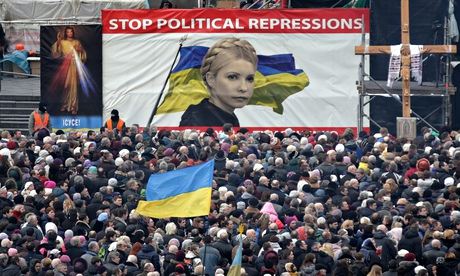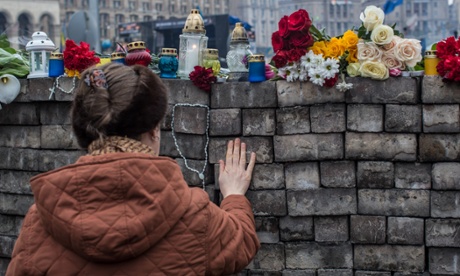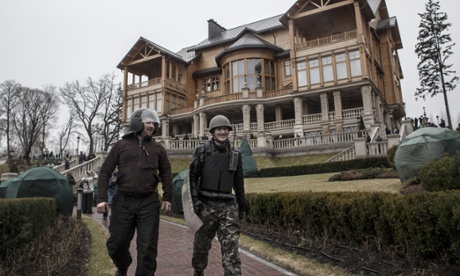Interim government signals that it will push for European integration as Russia recalls ambassador for 'consultation'

A portrait of
Ukrainian opposition leader Yulia Tymoshenko is seen during a rally on
Independence Square in Kiev on Sunday. Photograph: Maxim Shipenkov/EPA
Western governments are scrambling to contain the fallout from Ukraine's weekend revolution, pledging money, support and possible EU membership, while anxiously eyeing the response of Russia's president, Vladimir Putin, whose protege has been ousted.
Seemingly the biggest loser in the three-month drama's denouement, the Kremlin has the potential to create the most mischief because of Ukraine's pro-Russian affinities in the east and south, and its dependence on Russian energy supplies.
Acting president Oleksander Turchinov said on Sunday night that Ukraine's new leaders wanted relations with Russia on a "new, equal and good-neighbourly footing that recognises and takes into account Ukraine's European choice".
But the tension between the Kremlin and the interim government was underlined when Russia recalled its ambassador to Ukraine on Sunday for "consultations" and to "analyse the situation from all sides", the foreign ministry said.
European Union foreign policy chief Catherine Ashton will travel to Ukraine on Monday, where she is expected to discuss measures to shore up the ailing economy.

A woman pays her respects at a memorial to killed anti-government protesters in Kiev. Photograph: Brendan Hoffman/Getty Images
With the whereabouts of the former president Viktor Yanukovych still uncertain, the Ukrainian parliament legitimised his downfall, giving interim presidential powers to an ally of Yulia Tymoshenko, the former PM who was released from jail on Saturday. Oleksandr Turchinov said the parliament should work to elect a government of national unity by Tuesday, before preparations begin for elections planned for 25 May.
Yanukovych appeared on television from an undisclosed location on Saturday night, claiming he was still president and comparing the protesters to Nazis, but he continued to haemorrhage support on Sunday; even the leader of his parliamentary faction said he had betrayed Ukraine, and given "criminal orders".
Western leaders, while welcoming the unexpected turn of events in Kiev, are worried about the country fracturing along pro-Russian and pro-western lines. They are certain to push for a new government that is as inclusive as possible to replace the collapsed and discredited administration of Yanukovych, who vanished within hours of signing an EU-mediated settlement with opposition leaders on Friday.
"France, together with its European partners, calls for the preservation of the country's unity and integrity and for people to refrain from violence," said Laurent Fabius, the French foreign minister.
British chancellor George Osborne said early on Monday that the UK was standing ready to help the country through schemes set up by the IMF and European Union.
"It's very, very early days, early hours, but the people of Ukraine seem to have demonstrated their wish to take their country into the future, to have stronger links with Europe, and I don't think we should be repelling that, we should be embracing that," he said speaking to journalists in Singapore.
"We should be there ready to provide financial assistance through organisations like the IMF, and of course a lot of this will take the form of loans and the like, but there will be good investments in the economy of Ukraine".
Putin, preoccupied with the closing ceremony of the Sochi Olympics, has not yet commented publicly on the violence of the past week and Yanukovych's flight from the capital. Angela Merkel phoned him on Sunday to press for assurances on Russia's reaction. Susan Rice, the national security adviser to Barack Obama, warned that Moscow would be making a "grave mistake" if it sent military aid to Ukraine.

Protesters roam the garden in front of the mansion of former Ukrainian president Viktor Yanukovych's home in Mezhygirya, near Kiev. Photograph: Etienne De Malglaive/Getty Images
"There are many dangers," said William Hague, the foreign secretary. "We don't know, of course, what Russia's next reaction will be. Any external duress on Ukraine, any more than we've seen in recent weeks … it really would not be in the interests of Russia to do any such thing."
Read More Here







No comments:
Post a Comment
Hello and thank you for visiting my blog. Please share your thoughts and leave a comment :)